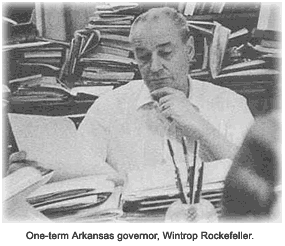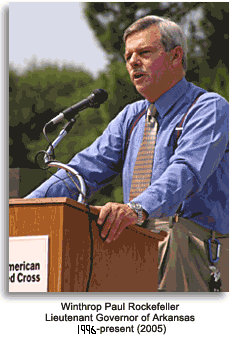A member of the famous Rockefeller Family, Winthrop was the fourth son of John D. Rockefeller Jr. and a grandson of the founder of Standard Oil. After a sterling combat career during World War II and a period of playboy indulgence, Winthrop moved to Arkansas, where he made a lasting impression on his adopted state.
 Winthrop was born on May 1, 1912, in New York City. He attended Yale University from 1931 to 1934. He entered the U.S. Army after the outbreak of World War II and rose from the rank of private to colonel. He was awarded a Bronze Star with clusters and a Purple Heart for his actions during a Kamikaze attack on his troopship.
Winthrop was born on May 1, 1912, in New York City. He attended Yale University from 1931 to 1934. He entered the U.S. Army after the outbreak of World War II and rose from the rank of private to colonel. He was awarded a Bronze Star with clusters and a Purple Heart for his actions during a Kamikaze attack on his troopship.
After the war, he married Barbara "Bobo" Sears in 1948, but entered his playboy period as well. His marriage ended in a messy and highly publicized divorce in 1954. He married Jeanette Idris in 1956.
In 1953, Rockefeller moved to Arkansas, where he established Winrock Enterprises and Winrock Farms. He quickly began to devote some of his personal wealth to the betterment of the people of Arkansas, by support for schools, colleges, and universities, as well as medical clinics in Arkansas' poorest counties. He was appointed by Governor Orval Faubus as the chairman of the Arkansas Industrial Development Commission and held that position until 1964.
In that year, Rockefeller conducted his first campaign for governor. The Republican Party in Arkansas was insignificant at that time, but Rockefeller breathed new life into it. He could not defeat Faubus and the entrenched Democratic organization, but in 1966, he tried again. Even though the number of declared Republicans was still tiny, dissatisfaction with the Democratic machine was sufficient for a coalition of Republicans and Democratic reformists to carry Rockefeller to victory.
In the next four years, Rockefeller chalked up some notable achievements. Dismayed by conditions in the Arkansas prison system, he reformed it and moved it towards a professional level by establishing the new Department of Corrections. He worked to improve the state's dismal educational performance by securing funds for school construction and better teacher salaries. He also built bridges to Arkansas' black communities and integrated draft boards for the first time. In 1968, he was the only Southern governor to publicly mourn the death of Martin Luther King Jr., stating from the steps of the Capitol, “I am not my brother’s keeper. I am my brother’s brother.”
 Most of Rockefeller's second term was spent struggling with a recalcitrant, Democratically controlled senate. Making his final bold move as governor, Rockefeller commuted the sentences of every prisoner on Arkansas' Death Row and urged other state governors to do the same.
Most of Rockefeller's second term was spent struggling with a recalcitrant, Democratically controlled senate. Making his final bold move as governor, Rockefeller commuted the sentences of every prisoner on Arkansas' Death Row and urged other state governors to do the same.
In 1970, Rockefeller expected to face Faubus again, but the Democratic nomination was won by young and energetic Dale Bumpers, who defeated him in November. In 1972, Rockefeller was diagnosed with inoperable cancer. Following chemotherapy, he died in Palm Springs, California, on February 22, 1973. His son from his first marriage, Winthrop Paul Rockefeller, later became lieutenant governor of Arkansas.